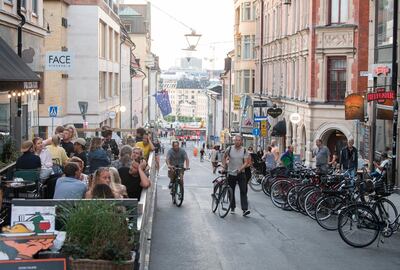Sweden has experienced its highest six-month death toll in 150 years leading to questions over its relaxed approach to coronavirus lockdown measures.
Support for the partial shutdown that has seen schools and restaurants stay open throughout the pandemic has dropped by 11 per cent, recent opinion polls showed.
But the Scandinavian country’s infection rate continues to fall, dropping by one third in the past week from about 300 per day to 200.
New figures from the Statistics Office showed a total of 51,405 Swedes died from all causes in the six-month period to June, a number higher than in any year since 1869, when 55,431 people died, mainly owing to a famine. The population of Sweden was just over 4 million then compared with 10 million today.

Covid-19 caused slightly under 10 per cent of fatalities in the first six months of the year. In April the number of deaths was almost 40 per cent higher than average because of a surge in Covid-related fatalities.
While never officially confirmed, it is believed that the Swedish government’s relaxed approach to lockdown was adopted so infections would spread at a rate that would eventually provide Sweden's population with "herd immunity" to the coronavirus. If more than 60 per cent of the population contracted Covid-19 and then developed immunity to it, the coronavirus might die out and Swedes would not have to rely on a vaccine.
The authorities had predicted that in Stockholm 40 per cent would contract Covid-19 and develop protective antibodies but the latest study showed only 15 per cent of people in the capital had been infected.
The Swedish approach has been questioned in the past week after emails from the country's chief epidemiologist were obtained under freedom of information laws. As the virus was spreading in March, Anders Tegnell appeared to ask whether higher fatalities among the elderly might be acceptable if they led to quicker herd immunity. “One point would be to keep schools open to reach herd immunity faster,” Dr Tegnell wrote.
The latest Ipsos poll has shown that confidence in the government’s coronavirus handling has dropped by 11 points to 45 per cent since April and backing for the national public health agency is down 12 points.
Sweden has relied on largely voluntary lockdown measures focusing on social distancing and allowing restaurants and schools to remain open on condition they follow the guidelines. As a result, the economy has not suffered as badly as other countries although it has seen an 8.6 per cent contraction in GDP in the past three months.
However Sweden, with 5,805 Covid-19-related fatalities, has experienced much higher death rates than other Scandinavian countries although more in line with hard-hit nations such as Britain and Spain. Norway, which imposed a stricter lockdown, has only suffered 260 deaths.
But after an initially high mortality rate caused by the virus spreading through care homes for the elderly, the number of daily deaths has dropped to an average of one per day in the past week.
The Swedish government has ordered an inquiry into what went wrong in care homes, where thousands died after being exposed to Covid-19.








